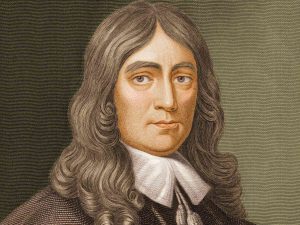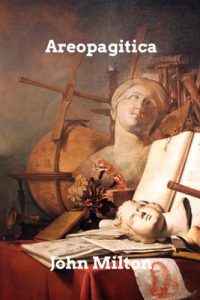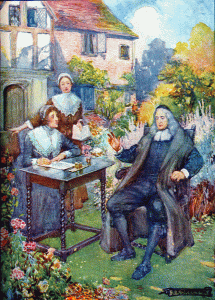Paying homage to the great poet and laureate, John Milton on his birth anniversary, Kamlesh Tripathi revisits some of his famous works that earned a reputation despite his physical impairment.

Milton became blind in both eyes in the year 1652. He was just 43 then. However, despite his blindness, Milton did not hang his boots. His condition compelled him to dictate his verses and prose to amanuenses, who then copied them out for him. Apart from his towering literary accomplishment, Milton has one more accomplishment where he stands out which is the overcoming of his blindness to continue writing. Though he had achieved due fame and recognition even before he became blind when he wrote his celebrated book Areopagitica in 1644 to condemn the pre-publication censorship, his works after he turned blind were also masterpieces. Areopagitica is among history’s most influential and impassioned defense of freedom of speech and freedom of the press. Milton acknowledged that books can harm. He opined that books are not dead items. They contain a potency of life in them. They are as active as the soul who has written them, whose progeny they are. They are as vigorous as the Dragon’s teeth. He who kills a Man kills a reasonable creature who is God’s image; but he who destroys a book kills reason itself, rather kills the image of God.
After Milton turned blind he published another masterpiece, his life’s best. This was the epic poem titled ‘Paradise Lost’ in 1667, written in blank verse at a time of immense religious flux and political upheaval. It addresses the fall of man, including the temptation of Adam and Eve plotted by the fallen angel Satan and God’s expulsion of them from the Garden of Eden. The poem opens with the lines: “Of Man’s First Disobedience, and the Fruit Of that Forbidden Tree, whose mortal taste Brought Death into the World, and all our woe.” The ‘first disobedience’ comes about when the devil, in the form of a serpent, tempts Eve to take and eat some fruit from the Tree of Knowledge. Eve then tells Adam what she has done and he too tastes the forbidden fruit.
 English poet William Cowper, in one of his letters, addressed to one William Hayley describes his dream about Milton. He places Milton in high esteem and asks Hayley, what would he give up to have such a dream about Milton. Further, describing Milton he writes in the letter ‘He was gravely, but very neatly attired in the fashion of his day, and had a countenance which filled me with those feelings that an affectionate child has for a beloved father’. He further writes, while dreaming I first wondered, where was he, hiding for so many years. I was overjoyed to find him still alive. I was exuberant to find myself in his company and I finally accosted him. I spoke to him about ‘Paradise Lost’ and told him the long story of when I first discovered it and how it affected me as a schoolboy. Milton then grasped my hand and charmed me. I feared I might fatigue him by talking too much. I thought he was some two hundred years old, so we took leave of each other. His person, and his manner, were all so perfectly characteristic, that I’m forced to think an apparition of him could not represent him more completely. Such was Milton’s charm.
English poet William Cowper, in one of his letters, addressed to one William Hayley describes his dream about Milton. He places Milton in high esteem and asks Hayley, what would he give up to have such a dream about Milton. Further, describing Milton he writes in the letter ‘He was gravely, but very neatly attired in the fashion of his day, and had a countenance which filled me with those feelings that an affectionate child has for a beloved father’. He further writes, while dreaming I first wondered, where was he, hiding for so many years. I was overjoyed to find him still alive. I was exuberant to find myself in his company and I finally accosted him. I spoke to him about ‘Paradise Lost’ and told him the long story of when I first discovered it and how it affected me as a schoolboy. Milton then grasped my hand and charmed me. I feared I might fatigue him by talking too much. I thought he was some two hundred years old, so we took leave of each other. His person, and his manner, were all so perfectly characteristic, that I’m forced to think an apparition of him could not represent him more completely. Such was Milton’s charm.
Milton’s rendezvous with literature continued further when in the year 1671, along with the publication of his title ‘Paradise Regained’ he added ‘Samson Agonistes’ which is a tragic drama. (On the title page of ‘Paradise Regained A Poem’ he added Samson Agonistes). The drama commences in medias res (in the middle of things). Samson (the last of the judges of the ancient Israelites) has been captured by the Philistines and has had his hair, the mainstay of his strength cut off and his eyes cut out. Samson is now “Blind among enemies, O worse than chains”. Near the beginning of the play, Samson humbles himself before God by admitting that his power is not his own: “God, when he gave me strength, to show withal / How slight the gift was, hung it in my hair”.
the publication of his title ‘Paradise Regained’ he added ‘Samson Agonistes’ which is a tragic drama. (On the title page of ‘Paradise Regained A Poem’ he added Samson Agonistes). The drama commences in medias res (in the middle of things). Samson (the last of the judges of the ancient Israelites) has been captured by the Philistines and has had his hair, the mainstay of his strength cut off and his eyes cut out. Samson is now “Blind among enemies, O worse than chains”. Near the beginning of the play, Samson humbles himself before God by admitting that his power is not his own: “God, when he gave me strength, to show withal / How slight the gift was, hung it in my hair”.
When Samson dies the speech of Samson’s father over his death is no inappropriate epitaph for Milton himself … ‘Nothing is here for tears, nothing to wail/ Or knock the breast, no weakness, no contempt, Disparate, or blame, nothing but well and fair, And what may quiet us in a death so noble’.
In writing the poem and choosing the character of Samson as his hero, Milton perhaps was also illustrating his blindness, which afflicted him in his later life. Yet, he overcame it with his literary miracles.



